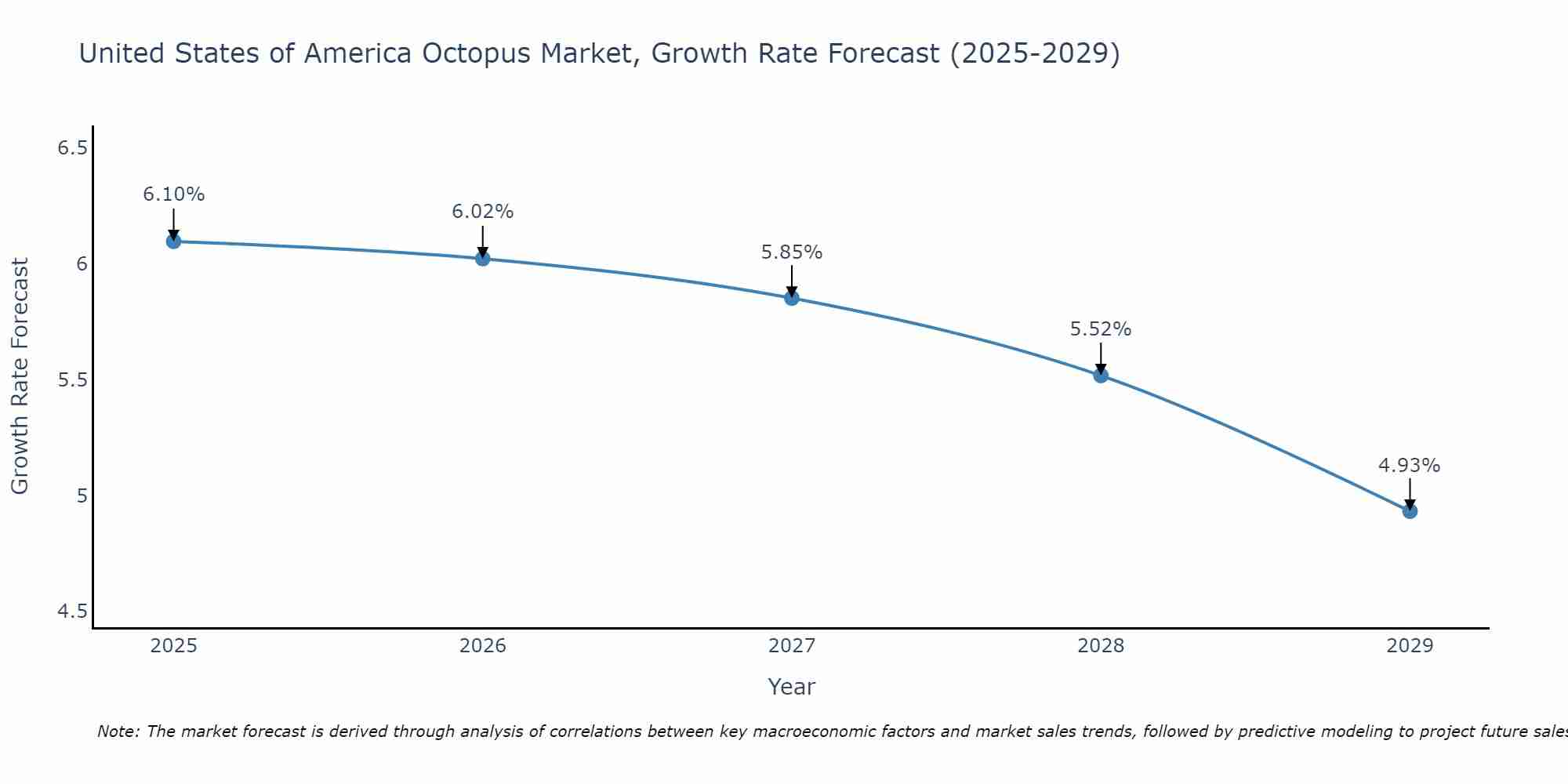United States (US) Octopus Market (2025-2031) Outlook | Value, Industry, Revenue, Share, Size, Analysis, Trends, Forecast, Growth & Companies
| Product Code: ETC387181 | Publication Date: Aug 2022 | Updated Date: Jul 2025 | Product Type: Market Research Report | |
| Publisher: 6Wresearch | Author: Sachin Kumar Rai | No. of Pages: 75 | No. of Figures: 35 | No. of Tables: 20 |
United States of America Octopus Market Size Growth Rate
The United States of America Octopus Market could see a tapering of growth rates over 2025 to 2029. Beginning strongly at 6.10% in 2025, growth softens to 4.93% in 2029.

United States (US) Octopus Market Synopsis
The United States octopus market is experiencing steady growth driven by increasing consumer demand for sustainable and high-quality seafood products. Octopus is becoming a popular choice among US consumers due to its unique flavor profile, versatility in cooking, and perceived health benefits. The market is primarily supplied by imports from countries like Spain, Mexico, and Morocco, with a growing interest in domestic octopus farming. Key players in the US octopus market include seafood distributors, restaurants, and retailers catering to the rising demand for octopus dishes. As consumers continue to seek out new and exotic culinary experiences, the US octopus market is expected to expand further, presenting opportunities for market players to innovate and differentiate their offerings to capture a larger share of this niche market segment.
United States (US) Octopus Market Trends
In the United States octopus market, there is a growing trend towards sustainable sourcing and ethical practices. Consumers are increasingly seeking out octopus products that are sourced responsibly, ensuring the well-being of marine ecosystems and communities. This trend is driving demand for certifications such as Marine Stewardship Council (MSC) and Aquaculture Stewardship Council (ASC) that guarantee sustainable practices in octopus fishing and farming. Additionally, there is a rising interest in innovative octopus dishes and preparations in the culinary scene, with chefs experimenting with different cooking techniques and flavor profiles to showcase the versatility of this seafood. Overall, the US octopus market is witnessing a shift towards sustainability and culinary creativity, catering to environmentally conscious consumers and food enthusiasts alike.
United States (US) Octopus Market Challenges
In the United States octopus market, key challenges include sourcing sustainable and ethical supply due to concerns about overfishing and bycatch. Octopus populations are vulnerable to environmental changes and have longer reproductive cycles, making them more susceptible to depletion. Additionally, the lack of standardized regulations for octopus fishing and trade complicates efforts to ensure responsible practices throughout the supply chain. Importantly, octopus is gaining popularity in the culinary world, leading to increased demand that further strains already delicate populations. Addressing these challenges requires collaboration between industry stakeholders, policymakers, and conservation groups to establish and enforce sustainable fishing practices, traceability measures, and consumer education initiatives to promote responsible consumption.
United States (US) Octopus Market Investment Opportunities
The US octopus market presents various investment opportunities, driven by the increasing demand for octopus in the culinary industry. Investing in aquaculture companies that specialize in octopus farming can be a lucrative option as it addresses the challenges of wild-caught octopus sustainability. Additionally, investing in technology and equipment providers for octopus farming can offer growth potential as the industry continues to evolve. Another opportunity lies in supporting research and development initiatives focused on improving octopus breeding techniques and sustainability practices. Furthermore, investing in businesses involved in the distribution and marketing of octopus products can capitalize on the growing consumer interest in seafood delicacies. Overall, the US octopus market offers diverse investment avenues for those looking to capitalize on the rising popularity of octopus in the culinary world.
Jordan Agar Market Government Policies
Government policies related to the US Octopus Market primarily focus on sustainable harvesting practices to ensure the long-term health of octopus populations. The National Oceanic and Atmospheric Administration (NOAA) and the Gulf of Mexico Fishery Management Council regulate octopus fisheries through measures such as catch limits, size restrictions, and seasonal closures to prevent overfishing and protect the species` habitat. Additionally, the Marine Mammal Protection Act and Endangered Species Act play a role in safeguarding octopus populations and their ecosystems. Monitoring and enforcement efforts are also in place to ensure compliance with these regulations, promoting responsible and environmentally conscious practices within the US octopus market.
United States (US) Octopus Market Future Outlook
The future outlook for the United States octopus market appears promising, driven by increasing consumer interest in seafood delicacies and the growing popularity of octopus in culinary circles. Factors such as the rising demand for exotic and sustainable seafood options, coupled with the versatility and nutritional benefits of octopus, are expected to fuel market growth. Additionally, advancements in fishing techniques and sustainable aquaculture practices are likely to ensure a steady supply of high-quality octopus to meet the rising demand. With a strong focus on food quality and sustainability, the US octopus market is projected to witness steady growth in the coming years, presenting opportunities for seafood suppliers, retailers, and restaurants to capitalize on this emerging trend.
Key Highlights of the Report:
- United States (US) Octopus Market Outlook
- Market Size of United States (US) Octopus Market, 2024
- Forecast of United States (US) Octopus Market, 2031
- Historical Data and Forecast of United States (US) Octopus Revenues & Volume for the Period 2021 - 2031
- United States (US) Octopus Market Trend Evolution
- United States (US) Octopus Market Drivers and Challenges
- United States (US) Octopus Price Trends
- United States (US) Octopus Porter's Five Forces
- United States (US) Octopus Industry Life Cycle
- Historical Data and Forecast of United States (US) Octopus Market Revenues & Volume By Product Type for the Period 2021 - 2031
- Historical Data and Forecast of United States (US) Octopus Market Revenues & Volume By Fresh for the Period 2021 - 2031
- Historical Data and Forecast of United States (US) Octopus Market Revenues & Volume By Processed for the Period 2021 - 2031
- Historical Data and Forecast of United States (US) Octopus Market Revenues & Volume By Application for the Period 2021 - 2031
- Historical Data and Forecast of United States (US) Octopus Market Revenues & Volume By Commercial for the Period 2021 - 2031
- Historical Data and Forecast of United States (US) Octopus Market Revenues & Volume By Food and Beverage for the Period 2021 - 2031
- Historical Data and Forecast of United States (US) Octopus Market Revenues & Volume By Distribution Channel for the Period 2021 - 2031
- Historical Data and Forecast of United States (US) Octopus Market Revenues & Volume By Direct for the Period 2021 - 2031
- Historical Data and Forecast of United States (US) Octopus Market Revenues & Volume By Indirect for the Period 2021 - 2031
- United States (US) Octopus Import Export Trade Statistics
- Market Opportunity Assessment By Product Type
- Market Opportunity Assessment By Application
- Market Opportunity Assessment By Distribution Channel
- United States (US) Octopus Top Companies Market Share
- United States (US) Octopus Competitive Benchmarking By Technical and Operational Parameters
- United States (US) Octopus Company Profiles
- United States (US) Octopus Key Strategic Recommendations
Frequently Asked Questions About the Market Study (FAQs):
- Single User License$ 1,995
- Department License$ 2,400
- Site License$ 3,120
- Global License$ 3,795
Search
Related Reports
- Portugal Electronic Document Management Market (2025-2031) | Strategy, Consumer Insights, Analysis, Investment Trends, Opportunities, Growth, Size, Share, Industry, Revenue, Segments, Value, Segmentation, Supply, Forecast, Restraints, Outlook, Competition, Drivers, Trends, Demand, Pricing Analysis, Competitive, Strategic Insights, Companies, Challenges
- France Electronic Document Management Market (2025-2031) | Strategy, Consumer Insights, Analysis, Investment Trends, Opportunities, Growth, Size, Share, Industry, Revenue, Segments, Value, Segmentation, Supply, Forecast, Restraints, Outlook, Competition, Drivers, Trends, Demand, Pricing Analysis, Competitive, Strategic Insights, Companies, Challenges
- Portugal Occupational Health & Safety Services Market (2025-2031) | Strategy, Consumer Insights, Analysis, Investment Trends, Opportunities, Growth, Size, Share, Industry, Revenue, Segments, Value, Segmentation, Supply, Forecast, Restraints, Outlook, Competition, Drivers, Trends, Demand, Pricing Analysis, Competitive, Strategic Insights, Companies, Challenges
- Netherlands Occupational Health and Safety Services Market (2025-2031) | Strategy, Consumer Insights, Analysis, Investment Trends, Opportunities, Growth, Size, Share, Industry, Revenue, Segments, Value, Segmentation, Supply, Forecast, Restraints, Outlook, Competition, Drivers, Trends, Demand, Pricing Analysis, Competitive, Strategic Insights, Companies, Challenges
- Belgium and Luxembourg Facility Management Market (2025-2031) | Strategy, Consumer Insights, Analysis, Investment Trends, Opportunities, Growth, Size, Share, Industry, Revenue, Segments, Value, Segmentation, Supply, Forecast, Restraints, Outlook, Competition, Drivers, Trends, Demand, Pricing Analysis, Competitive, Strategic Insights, Companies, Challenges
- Russia Women Intimate Apparel Market (2025-2031) | Strategy, Consumer Insights, Analysis, Investment Trends, Opportunities, Growth, Size, Share, Industry, Revenue, Segments, Value, Segmentation, Supply, Forecast, Restraints, Outlook, Competition, Drivers, Trends, Demand, Pricing Analysis, Competitive, Strategic Insights, Companies, Challenges
- Africa Chocolate Market (2025-2031) | Size, Share, Trends, Growth, Revenue, Analysis, Forecast, industry & Outlook
- Global Hydroxychloroquine And Chloroquine Market (2025-2031) | Industry, Trends, Size, Outlook, Growth, Value, Companies, Revenue, Analysis, Share, Forecast
- Saudi Arabia Plant Maintenance Market (2025-2031) | Industry, Size, Growth, Revenue, Value, Companies, Forecast, Analysis, Share & Trends
- Taiwan Electric Truck Market (2025-2031) | Outlook, Industry, Revenue, Size, Forecast, Growth, Analysis, Share, Companies, Value & Trends
Industry Events and Analyst Meet
Our Clients
Whitepaper
- Middle East & Africa Commercial Security Market Click here to view more.
- Middle East & Africa Fire Safety Systems & Equipment Market Click here to view more.
- GCC Drone Market Click here to view more.
- Middle East Lighting Fixture Market Click here to view more.
- GCC Physical & Perimeter Security Market Click here to view more.
6WResearch In News
- Doha a strategic location for EV manufacturing hub: IPA Qatar
- Demand for luxury TVs surging in the GCC, says Samsung
- Empowering Growth: The Thriving Journey of Bangladesh’s Cable Industry
- Demand for luxury TVs surging in the GCC, says Samsung
- Video call with a traditional healer? Once unthinkable, it’s now common in South Africa
- Intelligent Buildings To Smooth GCC’s Path To Net Zero













